The season/ed Edit: January 2025
Peak winter escapes: trading winter’s soft greys for crisp whites, vibrant products, and inspiring shops
It’s peak winter, and January unfolds in a palette of cool whites and soft greys, painting a world that feels both still and alive. These days, we escape the bustle of Viennese city life at least once a week for a snowy getaway on Salzburg’s endless ski slopes. There’s nothing like hours of crisp air, the satisfying crunch of snow underfoot—or under-ski?—and the joy of a mid-day lunch break with Kaiserschmarrn at one of the mountain huts.
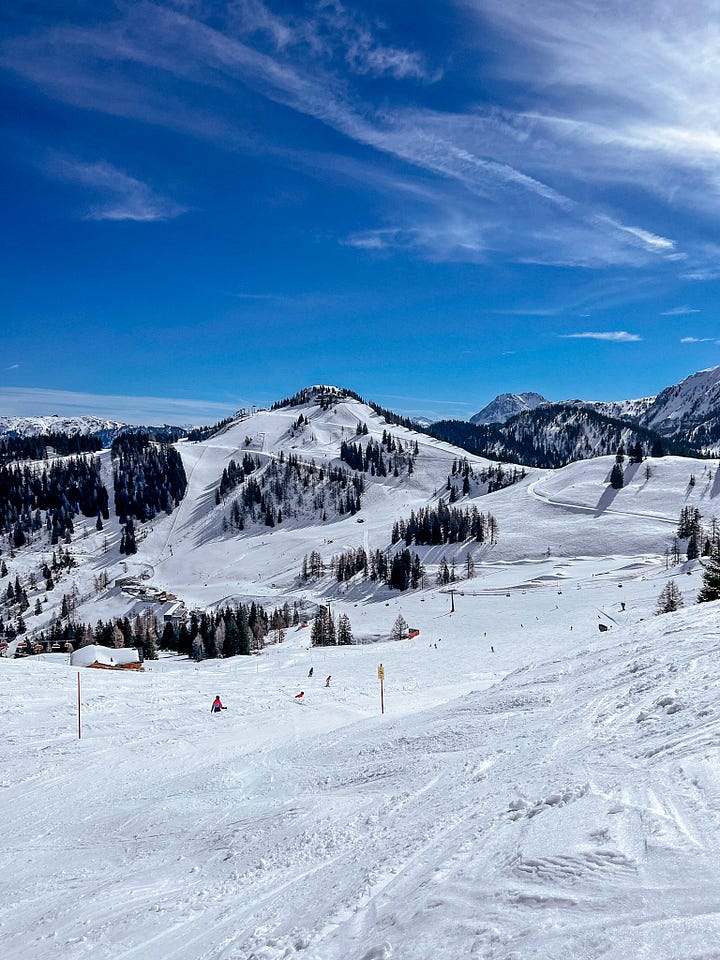
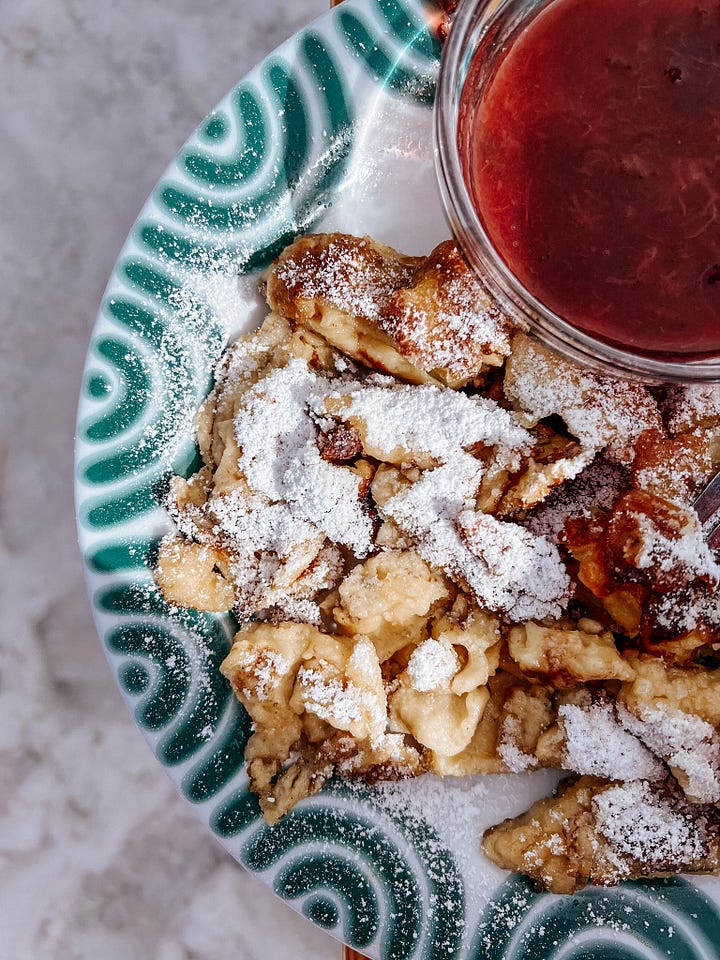
The journey itself is part of the magic. Taking the train to Salzburg feels like stepping into a moving postcard of winter’s quiet beauty. Departing in the early morning darkness in Vienna, we arrive just as the sun crests over the mountains in Salzburg, lighting up snow-covered fields and mist rising from the river Salzach along the way.
Back in Vienna, the city moves at its own winter pace. Grey days are softened by the warm glow of candles on our kitchen table, making even the coldest evenings feel inviting. For me, this is the time to cozy up with books, letting stories transport me to far-off places as I wait for the city’s ice skating rink to open—another seasonal highlight that brings a bit of fun to January and February in Vienna.
For moments of inspiration, Vienna’s museums offer me another vibrant escape from the subdued tones of winter. Recently, I was captivated by the work of Ghanaian artist Amoako Boafo, whose bold, expressive portraits felt like a celebration of diversity and identity. His pieces bring a richness and energy that contrast beautifully with the stillness of the season, reminding me of the colorful world that awaits beyond winter.


// markta has arrived in 1070
January brings exciting news for fellow Slow Food enthusiasts: the markta Markt at Zollergasse 9, 1070 Vienna (only 2 minutes from U3 Neubaugasse!) is here. It soft-launched two weeks ago and officially celebrated its opening last night.
As one of the first online shops showcasing products from Austrian Slow Food farmers, markta’s evolving food market concept has fascinated me since its early days in 2017. Originally an online farmer’s market, markta worked to bridge the gap between producers—who prioritise fair wages, animal welfare, ecological farming practices, and exceptional quality—and conscious consumers.
Initially, producers shipped their products directly to customers who ordered via Markta's platform. Soon, markta established its own logistics centre and took over the delivery process. The mission was clear: to make products from small Austrian farms and sustainable consumption more accessible and part of everyday life. The timing couldn’t have been better. Markta launched just before the COVID-19 pandemic, offering an online farmer’s market when it was most needed. Orders skyrocketed, rising from 150 per week to an incredible 2,500 per week at the peak of the lockdowns—challenging the Markta team to grow at such a rapid pace. However, like many businesses, the end of the pandemic brought new challenges, with online orders dropping and prompting Markta to rethink and revise its concept once again.
In 2023, markta opened its first brick-and-mortar shop in Vienna’s 9th district. Now, in 2025, they’ve expanded with a second location in the 7th district on Zollergasse—and they’re not stopping there. The goal? Ten shops across Vienna, creating a real alternative to supermarkets.
Why does this matter? In Austria, supermarkets dominate 85% of the food retail market, with producers sometimes earning as little as 12% of the final price, according to markta’s founder, Theresa Imre. She is determined to change that. “With markta, we aim to create an alternative to the status quo”, she explained during yesterday's press event. And talks about the pricing model: markta retains one-third of the price for its work, while two-thirds go directly to the producers. The price is determined in collaboration with the producers.
The new shop brings together 150 producers under one roof, replicating the variety of a farmer’s market within the city. For those specifically seeking Slow Food products, markta features a wide range of producers awarded for their work by Slow Food Österreich, including Hofkäserei Höflmaier with its delicious butter and cheeses, Biohof Pranger with its “Schätze im Glas” preserves, and mustard varieties from Pankrazhofer in Upper Austria. At the breakfast served, I also discovered the fantastic Wachauer Marillen marmalade from Landgut Schöne Erde. Markta’s commitment to offering a full assortment to truly replace supermarkets even extends to regionally produced toilet paper and kitchen paper towels. Across both locations, they now work with a total of 250 producers, with a waiting list of 2,000 more eager to join.
While most products are sourced from within Austria, Theresa encourages people to rethink what it means to buy local—regionality shouldn’t be confined by borders. Therefore, the shop’s right-hand wall features kilometre markers indicating distances to various locations, highlighting that Budapest is closer to Vienna than Vorarlberg. “As close as possible, as far as necessary”, Theresa says. For example, citrus fruits (bergamots are also available at the moment!) are sourced from Sicily, and coffee is sail-shipped from Latin America (by Brigantes), striking a balance between sustainability and diversity.
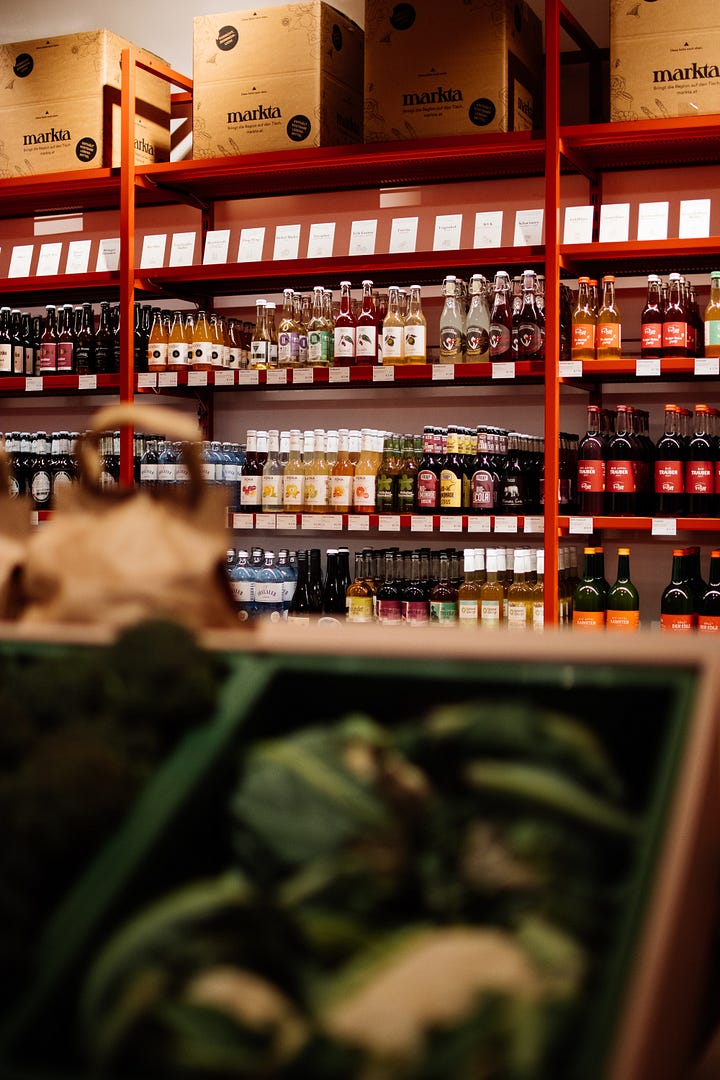
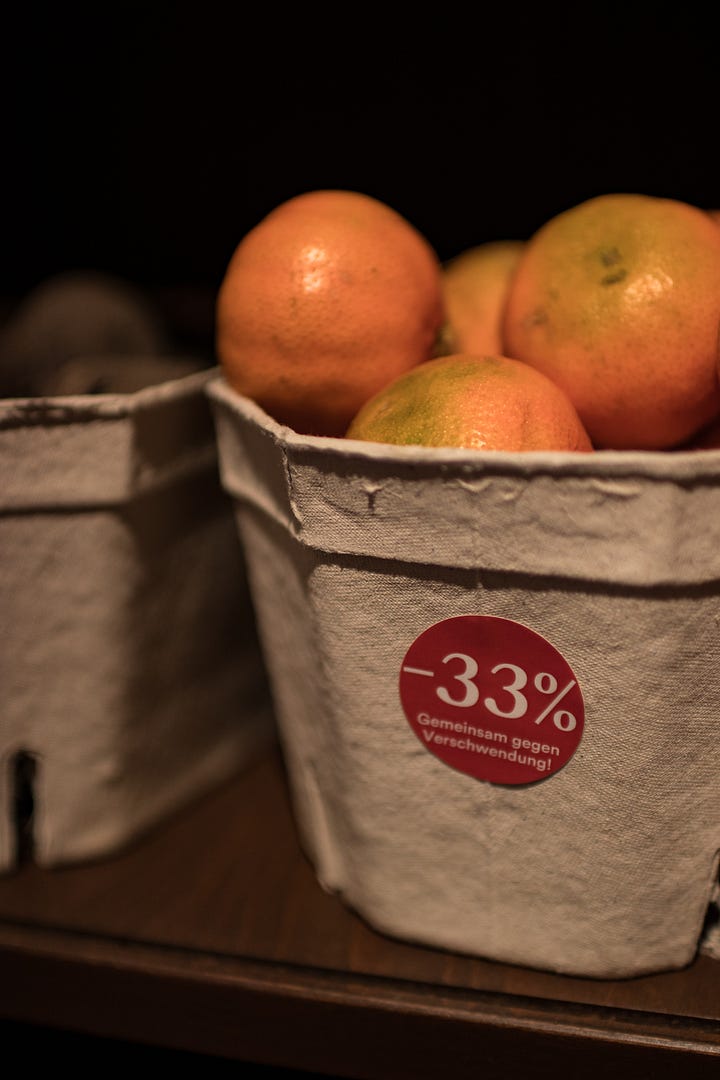
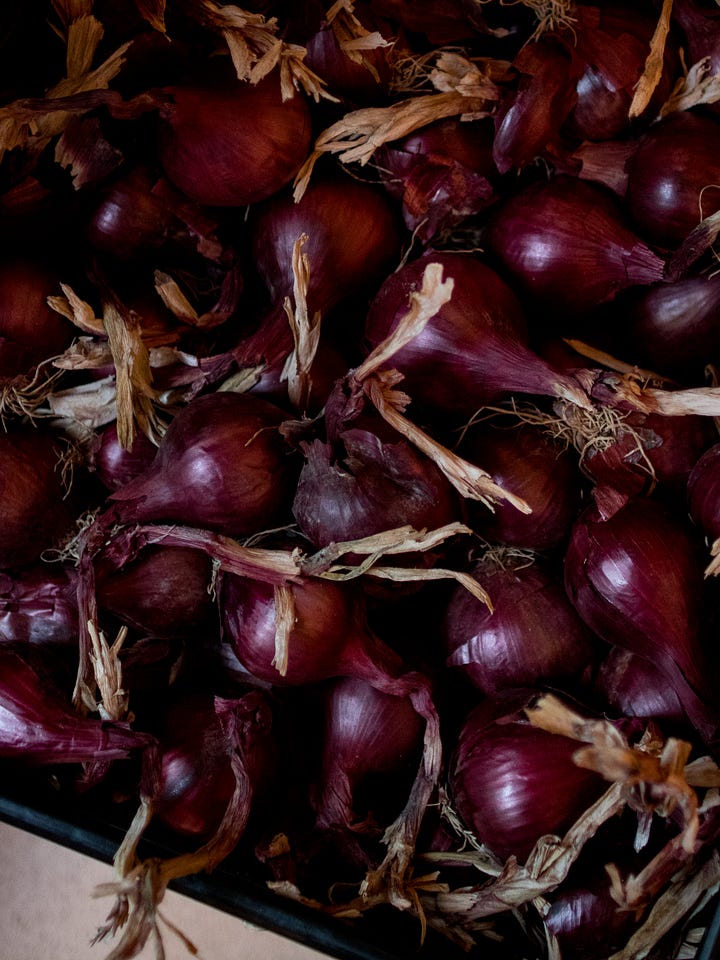
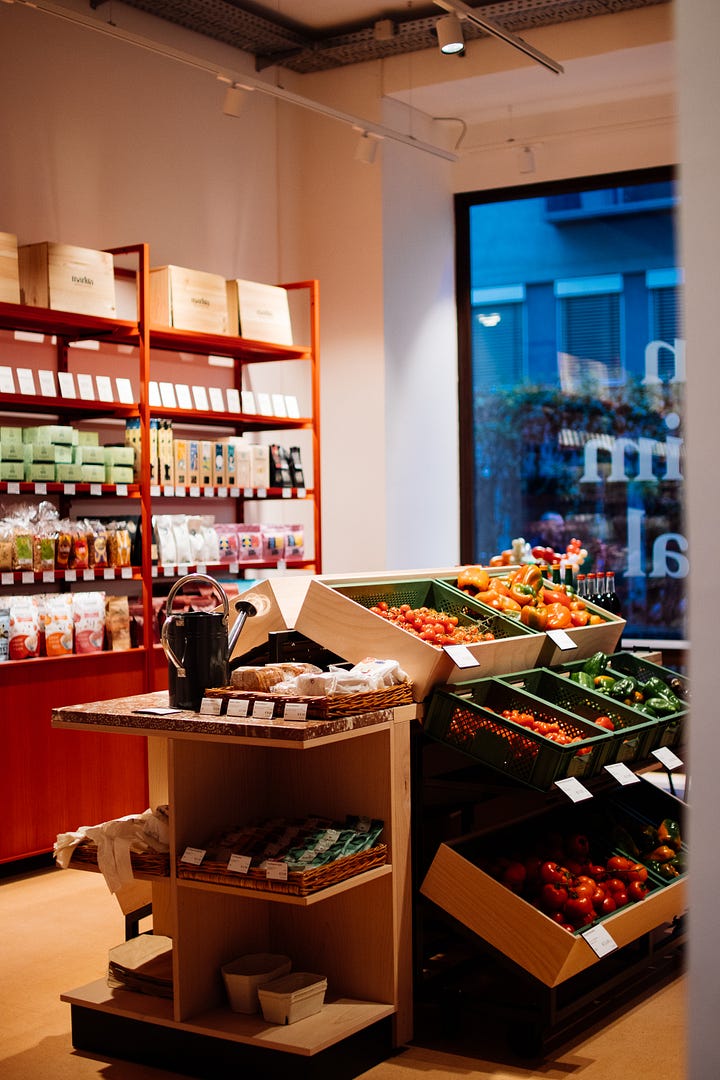
Zero waste is another cornerstone of markta’s philosophy. Very little goes to waste—any surplus is donated to organisations like Wiener Tafel and products nearing their sell-by date are discounted by 33%, with markta waiving its share of the margin to ensure producers still receive their full two-thirds.
Looking ahead, markta has even more plans for its 1070 location. In the basement of their new Zollergasse shop, they’re developing a Farm to Fork Center. This space will bring consumers and producers together, offering workshops and events to deepen knowledge about sustainable agriculture and regional products.
What left me inspired about markta
Theresa is genuinely passionate when she talks about her business. It’s fascinating to see how she combines her passion and vision with a strong sense of economic viability. She’s always ready with the numbers, openly discussing topics like rent prices and client numbers needed to stay profitable, while also speaking candidly about the challenges she faces. I find it incredibly empowering to see women like Theresa engage in real talk, refusing to gloss over the realities of running their own businesses.
Markta has been evolving its business model ever since its start, adapting whenever necessary. The 12-person team led by Theresa never seems to stand still, constantly learning quickly, improving, and optimizing. In fact, they appear to be ahead of the curve—just as they were with the online farmer’s market before the pandemic. While many brick-and-mortar shops are closing these days, Theresa is boldly expanding, opening more stores even during these challenging times. Shout-out to her for her courage and determination!
As someone who spends a lot of time researching Slow Food producers across Austria and learning their stories, I understand how challenging it is for these producers to make their products available beyond their farms. It’s truly amazing to now have a shop so close, just 2 minutes from U3 Neubaugasse, where you can find such a wide array of fantastic products, all in one place. Being able to browse and get inspired in a brick-and-mortar shop like this is super cool!
January’s favourites: seasonal picks
January is the perfect time to embrace a mix of cozy comforts at home and fresh inspirations out and about. It’s the season for strolling through brick-and-mortar shops—whether it’s exploring bookstores and coming home with a captivating read, browsing creative pop-ups for beautiful objects to brighten grey days, or finding joy in food markets and picking up spicy flavours to warm up the cold. Here are my picks for January.
// Bubble Plate by Zoë Denault
What I love about ceramics is discovering pieces that are simple yet unique and special—pieces that effortlessly become part of my everyday rituals, like a favourite coffee cup or a beautiful plate. That’s exactly what happened when I brought home Zoë Denault’s Bubble Plate from her first Studio May pop-up market.
Zoë, a Vienna-based visual artist, explores light, reflection, and texture across various media, but I’m absolutely in love with her clay works. The Bubble Plate, with its playful design and charm, had been on my wishlist for a long time and has now earned a permanent spot in my kitchen. It’s become my go-to vessel for storing citrus fruits, their vibrant yellows and oranges contrasting beautifully with the plate’s black and neutral tones.
P.S. Watch out for Zoë's new project Studio May!
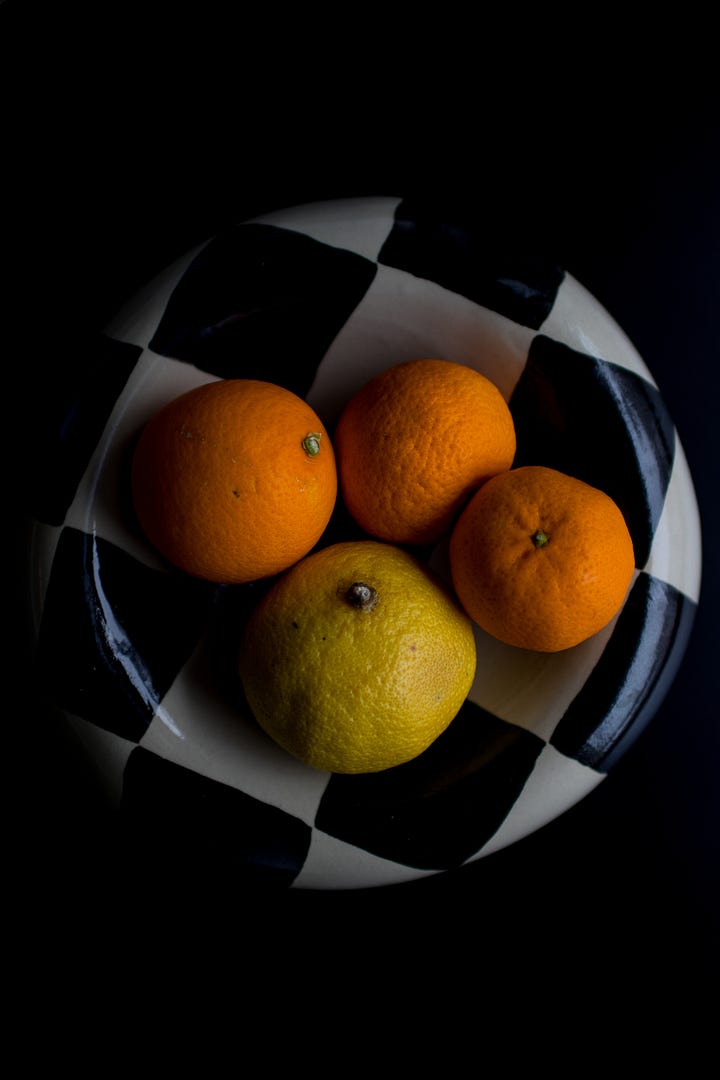
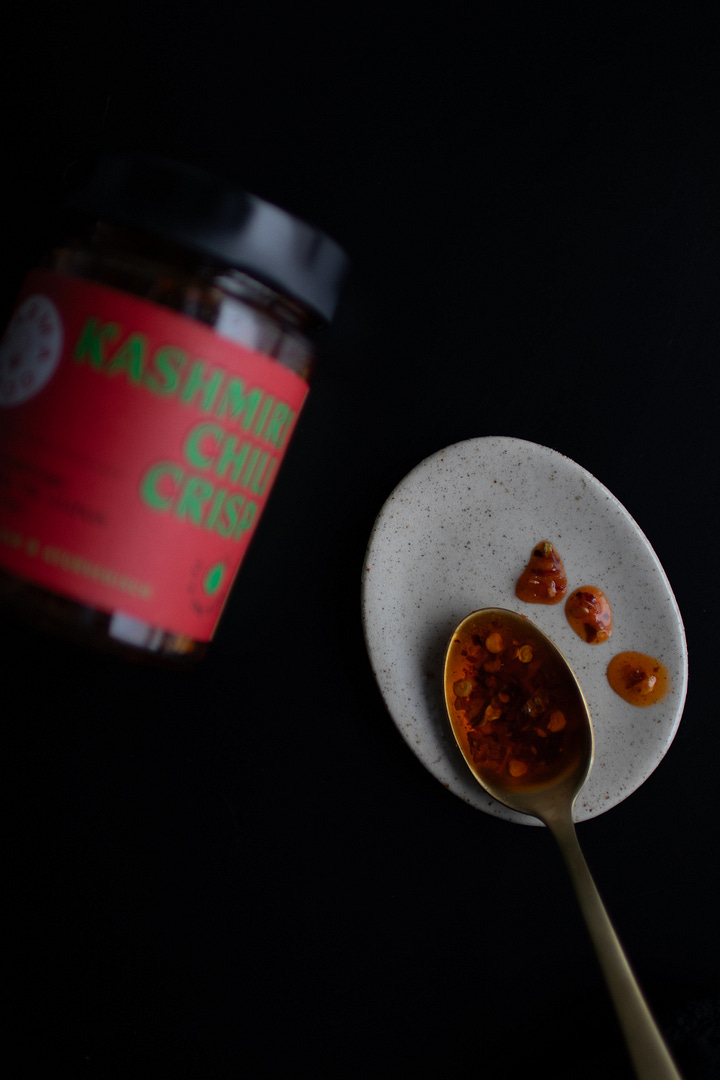
// Karma Food’s Kashmiri Chili Crisp
I’ve been a fan of cooking queen Nigella Lawson ever since a long-ago flight to Mexico City where her cooking show mesmerised me mid-air. Nigella absolutely LOVES chili crisp, and she’s the one who introduced me to it. I was instantly hooked and used Lao Gan Ma for years.
Then I discovered Karma Food’s Kashmiri Chili Crisp, and I was thrilled to find a locally produced, high-quality alternative that strikes the perfect balance of sweet, crispy, and fiery. Made with Kashmiri chilies, roasted garlic, and warming spices like star anise and cardamom, it’s a real all-purpose condiment. I drizzle it over poached eggs and use it of course for Nigella’s Fried Chicken Sandwich.
P.S. The Karma Food Kashimiri Chili Crisp is also available at Ototo!
// HAFI Books: A New English Bookshop
I finally made it to HAFI Books, the new English-language bookstore in Vienna’s 4th district, and I absolutely loved it! Their selection is impressive, with a thoughtfully curated range of both novels and non-fiction books.
On my first visit, I found “I would like your fruitiest, funkiest, most fermented Canephora on the Menu” by Mikolaj Pociecha, a barista and coffee expert at Suedhang. The book is as quirky as its title suggests, diving deep into the world (and potential) of Robusta coffee.
P.S. Try HAFI Books' Chai Latte when there. With its sugary cinnamon topping it's perfect for cold January days.
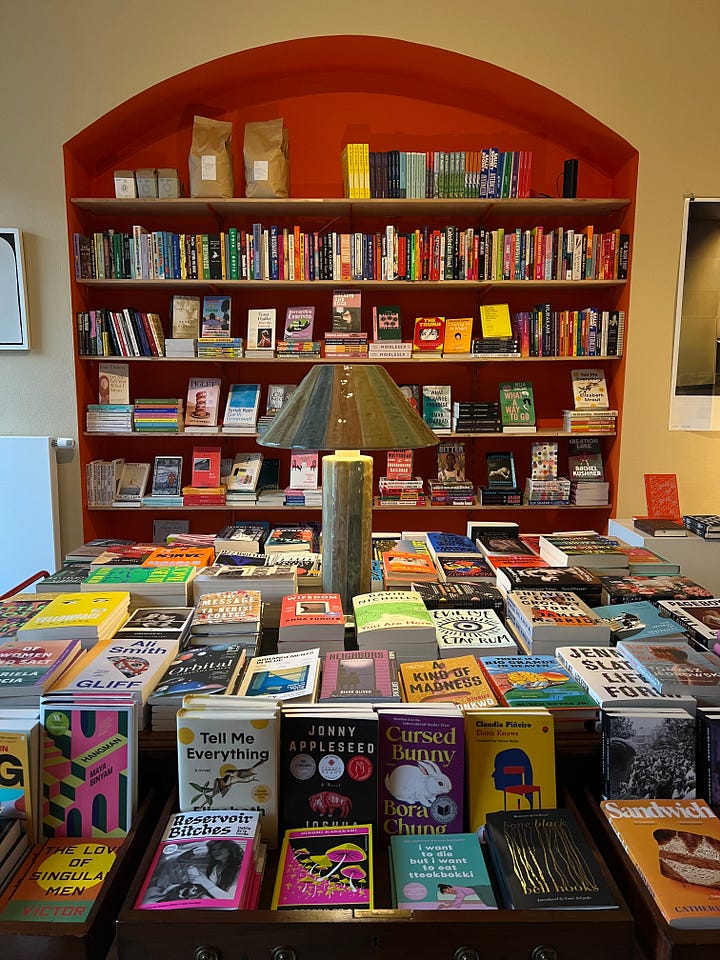
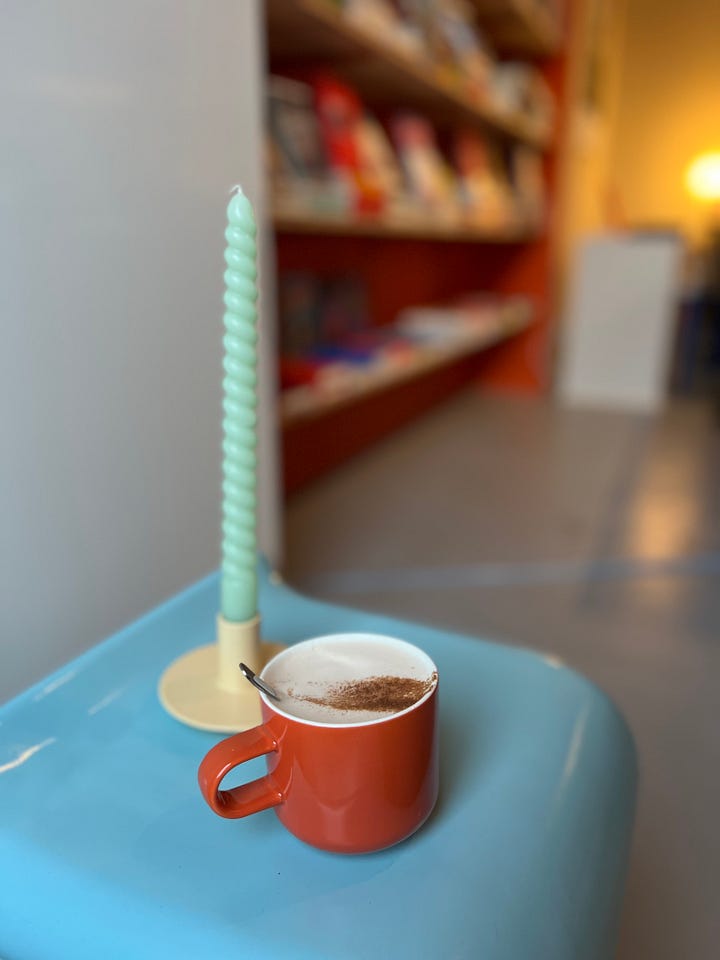
Thanks for reading season/ed! This publication is public so feel free to share it. Thanks for your support!







